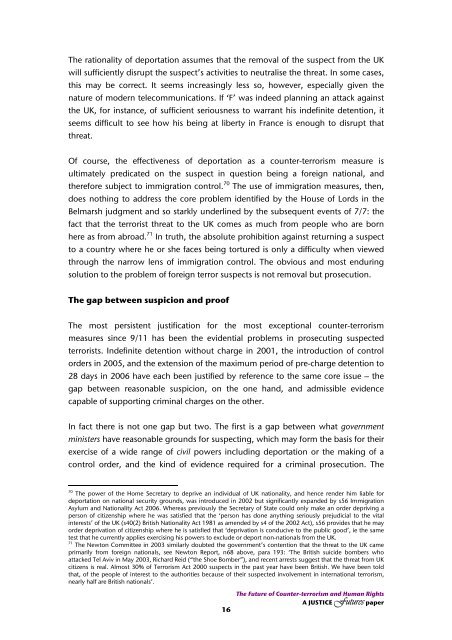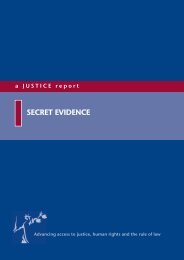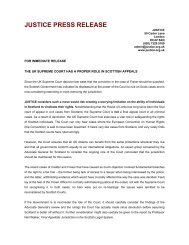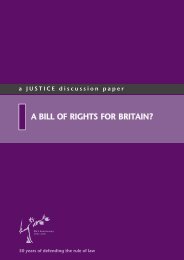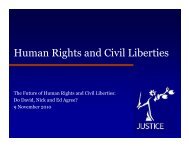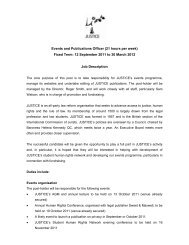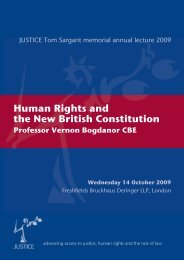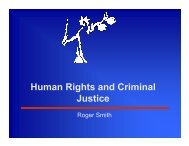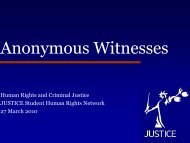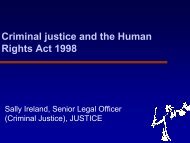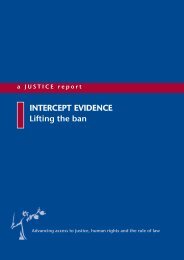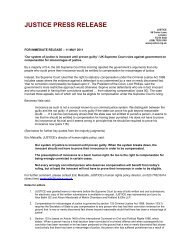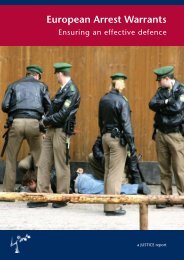The Future of Counter-terrorism and Human Rights - Justice
The Future of Counter-terrorism and Human Rights - Justice
The Future of Counter-terrorism and Human Rights - Justice
You also want an ePaper? Increase the reach of your titles
YUMPU automatically turns print PDFs into web optimized ePapers that Google loves.
<strong>The</strong> rationality <strong>of</strong> deportation assumes that the removal <strong>of</strong> the suspect from the UK<br />
will sufficiently disrupt the suspect’s activities to neutralise the threat. In some cases,<br />
this may be correct. It seems increasingly less so, however, especially given the<br />
nature <strong>of</strong> modern telecommunications. If ‘F’ was indeed planning an attack against<br />
the UK, for instance, <strong>of</strong> sufficient seriousness to warrant his indefinite detention, it<br />
seems difficult to see how his being at liberty in France is enough to disrupt that<br />
threat.<br />
Of course, the effectiveness <strong>of</strong> deportation as a counter-<strong>terrorism</strong> measure is<br />
ultimately predicated on the suspect in question being a foreign national, <strong>and</strong><br />
therefore subject to immigration control. 70 <strong>The</strong> use <strong>of</strong> immigration measures, then,<br />
does nothing to address the core problem identified by the House <strong>of</strong> Lords in the<br />
Belmarsh judgment <strong>and</strong> so starkly underlined by the subsequent events <strong>of</strong> 7/7: the<br />
fact that the terrorist threat to the UK comes as much from people who are born<br />
here as from abroad. 71 In truth, the absolute prohibition against returning a suspect<br />
to a country where he or she faces being tortured is only a difficulty when viewed<br />
through the narrow lens <strong>of</strong> immigration control. <strong>The</strong> obvious <strong>and</strong> most enduring<br />
solution to the problem <strong>of</strong> foreign terror suspects is not removal but prosecution.<br />
<strong>The</strong> gap between suspicion <strong>and</strong> pro<strong>of</strong><br />
<strong>The</strong> most persistent justification for the most exceptional counter-<strong>terrorism</strong><br />
measures since 9/11 has been the evidential problems in prosecuting suspected<br />
terrorists. Indefinite detention without charge in 2001, the introduction <strong>of</strong> control<br />
orders in 2005, <strong>and</strong> the extension <strong>of</strong> the maximum period <strong>of</strong> pre-charge detention to<br />
28 days in 2006 have each been justified by reference to the same core issue – the<br />
gap between reasonable suspicion, on the one h<strong>and</strong>, <strong>and</strong> admissible evidence<br />
capable <strong>of</strong> supporting criminal charges on the other.<br />
In fact there is not one gap but two. <strong>The</strong> first is a gap between what government<br />
ministers have reasonable grounds for suspecting, which may form the basis for their<br />
exercise <strong>of</strong> a wide range <strong>of</strong> civil powers including deportation or the making <strong>of</strong> a<br />
control order, <strong>and</strong> the kind <strong>of</strong> evidence required for a criminal prosecution. <strong>The</strong><br />
70 <strong>The</strong> power <strong>of</strong> the Home Secretary to deprive an individual <strong>of</strong> UK nationality, <strong>and</strong> hence render him liable for<br />
deportation on national security grounds, was introduced in 2002 but significantly exp<strong>and</strong>ed by s56 Immigration<br />
Asylum <strong>and</strong> Nationality Act 2006. Whereas previously the Secretary <strong>of</strong> State could only make an order depriving a<br />
person <strong>of</strong> citizenship where he was satisfied that the ‘person has done anything seriously prejudicial to the vital<br />
interests’ <strong>of</strong> the UK (s40(2) British Nationality Act 1981 as amended by s4 <strong>of</strong> the 2002 Act), s56 provides that he may<br />
order deprivation <strong>of</strong> citizenship where he is satisfied that ‘deprivation is conducive to the public good’, ie the same<br />
test that he currently applies exercising his powers to exclude or deport non-nationals from the UK.<br />
71 <strong>The</strong> Newton Committee in 2003 similarly doubted the government’s contention that the threat to the UK came<br />
primarily from foreign nationals, see Newton Report, n68 above, para 193: ‘<strong>The</strong> British suicide bombers who<br />
attacked Tel Aviv in May 2003, Richard Reid (“the Shoe Bomber”), <strong>and</strong> recent arrests suggest that the threat from UK<br />
citizens is real. Almost 30% <strong>of</strong> Terrorism Act 2000 suspects in the past year have been British. We have been told<br />
that, <strong>of</strong> the people <strong>of</strong> interest to the authorities because <strong>of</strong> their suspected involvement in international <strong>terrorism</strong>,<br />
nearly half are British nationals’.<br />
16<br />
<strong>The</strong> <strong>Future</strong> <strong>of</strong> <strong>Counter</strong>-<strong>terrorism</strong> <strong>and</strong> <strong>Human</strong> <strong>Rights</strong><br />
A JUSTICE <strong>Future</strong>s paper


